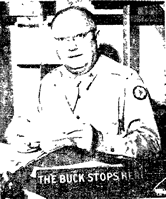Ever wonder where word, phrase, or saying comes from? Like balderdash or stool pigeon?
Heres a fun game to find out...
Ill start by giving the meaning and/or origin of a word orsaying, and then add one for the next person to tackle.
Once a person has posted the meaning/origin, they must leave a word or saying for the next person to solve, and so on.
(Note that there may be several meanings or origins to the word/saying, so just pick the one you like best.)
Here we go ..
Word/saying: The whole 9 yards
Meaning/Origin: This phrase (possibly) originated with W.W.II aircraft .50 caliber machine guns ammunition belts. The .50 caliber, both in heavy bombers and in fighter aircraft had 27 foot ammunition belts. It became a common phrase to say that a pilot or gunner "gave 'em the whole nine yards" when they had run out of ammunition.
Next: Red Letter Day
Heres a fun game to find out...
Ill start by giving the meaning and/or origin of a word orsaying, and then add one for the next person to tackle.
Once a person has posted the meaning/origin, they must leave a word or saying for the next person to solve, and so on.
(Note that there may be several meanings or origins to the word/saying, so just pick the one you like best.)
Here we go ..
Word/saying: The whole 9 yards
Meaning/Origin: This phrase (possibly) originated with W.W.II aircraft .50 caliber machine guns ammunition belts. The .50 caliber, both in heavy bombers and in fighter aircraft had 27 foot ammunition belts. It became a common phrase to say that a pilot or gunner "gave 'em the whole nine yards" when they had run out of ammunition.
Next: Red Letter Day

